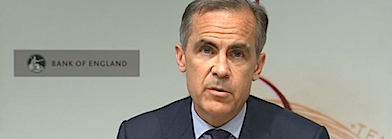The Bank of England — the UK’s central bank — raised interest rates for the first time in more than 10 years on Thursday but said it expected only “very gradual” further increases in rates as the UK attempts to exit the European Union.
The expectation of “very gradual” further increases in rates sent the pound down sharply.
The central bank’s Monetary Policy Committee (MPC) voted by a majority of 7 to 2 to increase the Bank Rate by 0.25 percentage points to 0.5%.
The Bank of England added in its statement: “The committee voted unanimously to maintain the stock of sterling non-financial investment-grade corporate bond purchases, financed by the issuance of central bank reserves, at £10 billion.
“The committee also voted unanimously to maintain the stock of UK government bond purchases, financed by the issuance of central bank reserves, at £435 billion.”
Bank of England Governor Mark Carney said the UK central bank was broadly in agreement with investors who expect two more 25 basis-point rate rises before the end of 2020.
“We in fact need those two additional rate increases in order to get that return of inflation to target,” Carney said.
“If you look closely at the forecast, inflation approaches the target, it doesn’t quite get there, and the economy is likely to be in a position of excess demand.”
